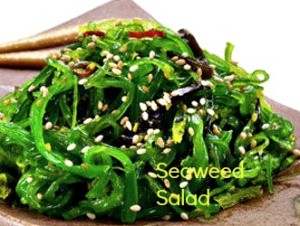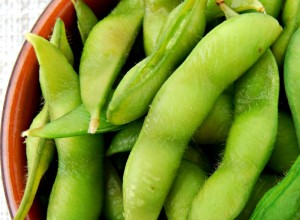I’ll be the first to admit, here’s where it gets a little mucky. This is why God invented dietitians– to help you sift through it all.
So I hope after reading my blog post on how to reduce hot flashes, you’re contemplating eating more soy foods BUT maybe you’ve HEARD that soy can suppress thyroid function. You are smart to wonder if this “soy thing” really is a good idea as soy does contain these funky plant nutrients called “goitrogenic compounds” that can interfere with our thyroid function. And so do other veggies like broccoli, kale, and cabbage. But this is only a problem when you are deficient in iodine.
So the key here is making sure you get enough iodine.
Just enough. Not too much. Because as with all nutrients, more does not always mean better.
Have you ever wondered why that Morton’s salt in your pantry is iodized? That’s because once upon a time, Americans weren’t getting enough iodine and as a result they were developing goiters. A goiter can appear as a lump in the neck that is a result of an iodine deficiency. Over farming was one reason we were having this problem, as we get iodine from the soil and depleted soil means depleted vegetables. After all, we are what we eat –eats. So salt companies began to add iodine to our food supply in the salt we add to foods to cure this epidemic deficiency.
Then something changed, the Food Network appeared on TV and chefs across America were using kosher salt to favor cuisine. And we copy what the chefs do. Yep, no iodine in that kosher salt. If you’re following my logic you can see the problem. Now if you still use good old Morton’s iodized table salt you can stop reading right now because you get enough iodine. A quarter teaspoon of salt provides 67 micrograms of iodine, which is about half of what we need or 50% of the U.S. Recommended Daily Allowance for iodine. And if you drink cow’s milk you get lots of iodine there too because dairy farmers clean their milk container with iodine. But what about if you don’t use salt or don’t drink milk?
Another good source is sea vegetables like kelp, and cod has it too, along with enriched grains, eggs or you can get it in a multi-vitamin.. Women need about 150 micrograms a day being careful not to go over 1,000 micrograms a day. Too much more than that can hurt your thyroid too. Just do us all a favor and never take an iodine supplement all by itself. That’s where you can get into trouble.
Here is a chart from the NIH you can review if interested on the iodine levels in foods. Hoping I helped clear up the muck at bit. Let me know if you have any questions in the comments below.
Heidi



[…] The research suggests that soy may not affect thyroid function if you have a normal thyroid. You may have heard that soy has so-called “goitrogenic” compounds (as do broccoli-family vegetables and flax seeds), which can interfere with thyroid function in people that do not eat enough iodine. If you are like me and use Kosher salt, then this could be the case. But the answer is still not to avoid these super healthy foods but to just make sure you get enough iodine. Read here for more about iodine. […]